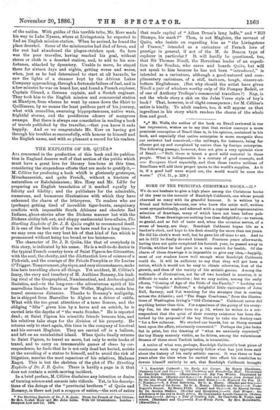THE EXPLOITS OF DR. Quits.* Ann concerned in the production
of this book and its publica- tion in England deserve well of that section of the public which must have a great love for literary bon-bons at this time, considering the stupendous efforts that are made to gratify it,— M. C6liere for producing a book which is gloriously grotesque, 3liinchaasenish, and quite French, without a tincture of naturalism or Rabelaisianism ; Mrs. Hoey and Xi. Lillie for preparing an English translation of it marked equally by felicity and fidelity ; and the publishers 'for the admirable, numerous, and humorous illustrations with which they have enhanced the charm of the letterpress. To readers who are (perhaps) getting tired of incredible tiger-hunts, sanguinary conflicts with impossible South Africans and obsolete Red Indians, ghost-stories after the Dickens manner but with the Dickens ability left out, and sloppy sentimental love-affairs, The Startling Exploits of Dr. T. B. Quies ought to recommend itself. It is one of the beet bits of fun we have read for a long time,— we may even say the very best bit- of that kind of fun which is pronounced without being too broad, or too boisterous.
The character of Dr. J. B. Quies, like that of everybody in this story, is indicated by his name. He is a well-to-do doctor in the typical French country town of Saint Pignon-les-Gironettes, with the soul, the obesity, and the dilettantish love of science of a Pickwick, and the courage of Sir Frizzle Pumpkin or Sir Lucius O'Trigger. Temperament, physique, and easy circumstances, make him hate travelling above all things. Yet accident, M. Celiere's fancy, the envy and treachery of M. Anthime Bonamy, his lead- ing rival of the Geographical, Numismatical, and Archaeological Societies, and—in the long-run--the adventurous spirit of his marvellous Sancho Panza or Sam Weller, Magloire, make him travel enormous distances. Thanks to Bonamy's malignity, he is shipped from Marseilles to Algiers as a driver of cattle. What with the too great attentions of a tame lioness, and the obliging " lifts " given him by a horse and an ostrich, he is carried into the depths of " the waste Soudan." He is reported dead ; at Saint Pignon his scientific friends bemoan him, and his relatives take steps for the division of his property. He returns only to start again, this time in the company of his rival and his servant Magloire. They are carried off in a balloon, and left on an uninhabited island. When Wes finally returns to Saint Pignon, to travel no more, but only to write books of travel, and to carry on innumerable games of chess by cor- respondence, he finds that he is not only dead but buried, assists at the unveiling of a statue to himself, and to avoid the risk of litigation, marries the most rapacious of his relatives, Madame Ragot. This is but the skeleton of the plot of The Startling Exploits of Dr. T. B. Quies. There is hardly a page in it that does not contain a mirth-moving incident.
In a brief preface, M. C6liere disclaims any intention or desire of turning science and savants into ridicule. Yet, in his descrip- tions of the doings of the " provincial brethren " of Wits and Bonamy, is there not just a soupcon of satire,—the sort of satire
• The Startling. Exploits of Dr. J. B. Quiet, From the French of Paul Mere. My Mrs. Cashel Hoey and Mr. John Lillie. With 120 Illustrations. London : Sampson Low and Co. 1886.
that made capital of " Aiken Drum's lang ladle," and " Bill Stumps, his mark ?" Then, is not Magloire, the servant of Quies, who insists on regarding him as " the Livingstone of France," intended as a caricature of French love of prestige in general, if not of the M. de Brazza type of explorer in particular P It will hardly be questioned, too, that Sir Thomas Nicoll, the Herculean leader of an expedi- tion in the Soudan, who saves and boards Quies, but will not speak to him because he has not been " introduced," is intended as a caricature, although a good-natured and com- plimentary caricature, of a stiff, taciturn, tough, sincere-at- bottom Englishman. (Bat why should the artist have given Nicoll a pair of whiskers worthy only of Sir Pompey Bedell, or of one of Anthony Trollope's commercial travellers P) Nay, is not the whole story a skit on the Jules Verne style of boy's book ? That, however, is of slight consequence ; for M. C6liere's satire is kindly. To adult readers, too, it will appear as that ingredient in his story which renders the charm of the whole firm and good.


































 Previous page
Previous page